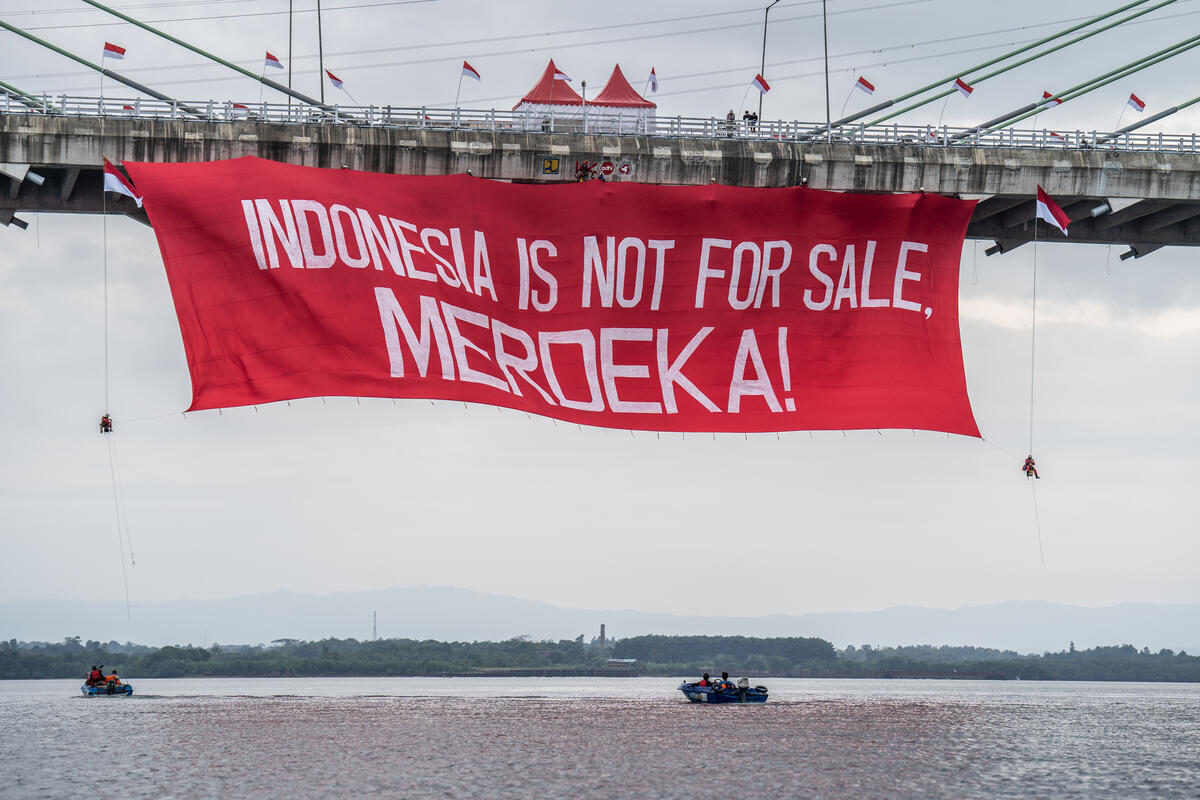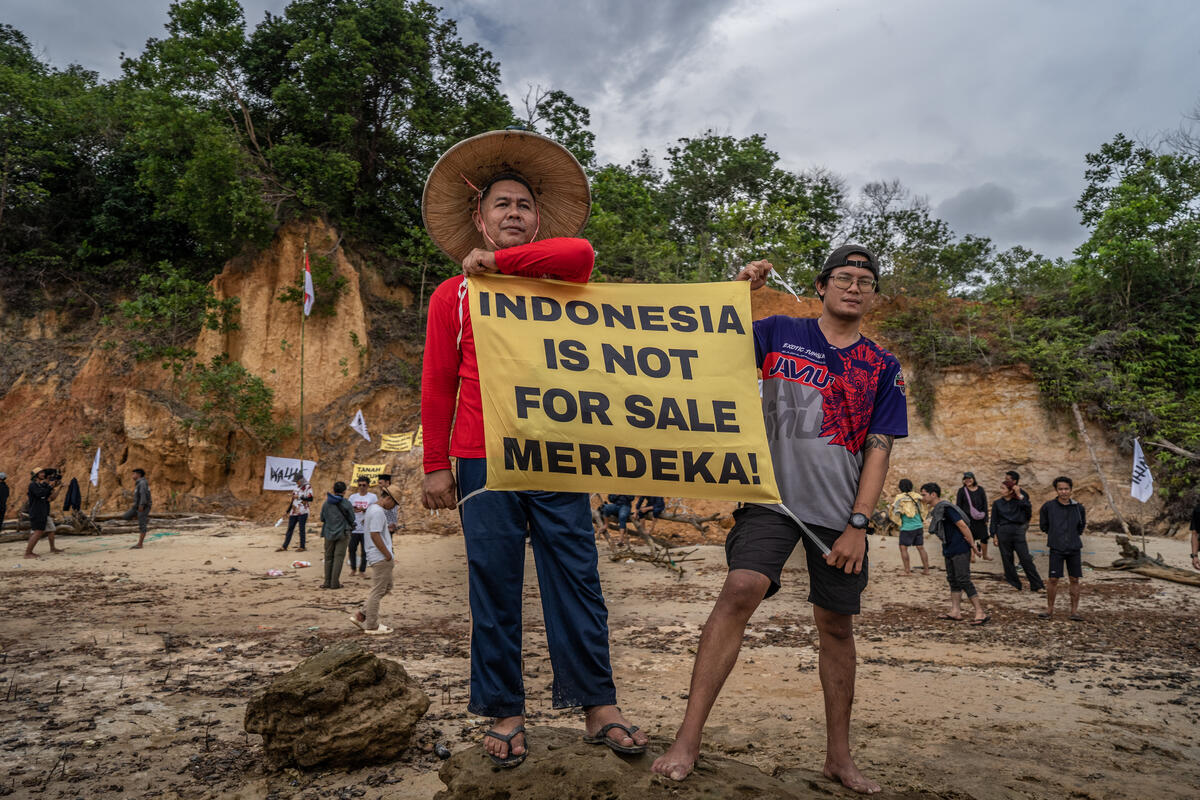
East Kalimantan, August 17, 2024. While President Jokowi was overseeing the first celebration of Indonesian Independence Day at the construction site of the nation’s new capital on Borneo island, a group of local residents and environment and democracy activists marked Independence Day with their own gathering nearby. At the community event in Penajam-North Paser, not only was the Indonesian flag raised, but Greenpeace activists unfurled a 50m long red-and-white banner reading “Indonesia is not for sale: Merdeka! (Freedom!)” on the main bridge leading to the new capital (Nusantara).
The community event began with a commemoration of the 79th year of Indonesian independence. Dozens of people from a number of villages, along with civil society organizations, held a flag-raising ceremony at Lango Beach in Penajam District.
The gathering took place both on land and on the waters flowing under the bridge, where dozens of locals and activists voiced concerns about environmental damage and the weakening of democracy during President Jokowi’s 10-year term, due to end in October. They took to boats with signs including “Save Balikpapan Bay”, “Protect Indigenous Peoples’ Rights”, “Not Yet Free to Speak” and “79 Years of Independence, 190 Years of Colonization” – the latter message referring to President Jokowi’s move to sidestep the constitutional ban on foreign land ownership by granting 190-year leases for investors in the new capital city.

Arie Rompas, Greenpeace Indonesia forest campaign team leader said: “President Jokowi’s apology in yesterday’s national address rings hollow after a decade of his leadership that has only led us further away from the ideals of independence. As his presidency comes to an end, he leaves behind a legacy of deep-seated injustices. Instead of ‘dedicating [himself] to the nation and the people’ as he vowed upon taking his oath of office, Jokowi’s government has weakened the right to free speech, crippled anti-corruption efforts and introduced policies such as the Omnibus Law on Job Creation that have made the public and the environment more vulnerable.”
“On the other hand, Jokowi has rolled out the red carpet for the oligarchy through his problematic policies. One of these is the reckless construction of Nusantara that is damaging the environment and displacing Indigenous communities. “It’s as if he’s selling out the country, granting land control in Nusantara to investors for up to 190 years,” Arie said.
The new capital city Nusantara is a microcosm of what has occurred all over Borneo over the past several decades, where government collusion with pulpwood and palm oil oligarchs has been the primary driver for the deforestation of 15 million hectares and the grand theft of land from Indigenous and local communities. During this time, half of the Bornean orangutan population was impacted by logging, deforestation, and the expansion of industrial plantations, and at least 150,000 individual orangutans were lost.
Similarly, within the confines of the Nusantara project boundary, 20 thousand hectares of forest was lost over the past five years, mostly to logging and industrial plantations. Today, there is only 31,364 hectares of native forest remaining within the greater Nusantara boundary, including a mangrove forest area of 12,819 hectares. The fear is that President Jokowi’s pledge to develop Nusantara as a “forest city” is nothing more than empty rhetoric, as it is not backed by concrete efforts to protect remaining forestland or to restore that which has been damaged.
The Nusantara project is itself a significant threat to biodiversity. Construction has involved clearing an area of mangroves at the upper reaches of Balikpapan Bay for the passage of heavy machinery. The destruction of these mangroves, combined with the massive increase in water traffic within the bay— a habitat for Irrawaddy dolphins, dugongs, and saltwater crocodiles — has disrupted the local ecosystem, leading to increasing conflicts between wildlife and local communities in recent years.
Jokowi’s haste in moving Indonesia’s capital city without reforming the extractive and unsustainable pattern of development so far amounts to a major blunder. There is a strong need to overhaul policies and adopt an approach that is more careful, participatory and just, prioritising environmental sustainability and land rights for Indigenous and local communities. Otherwise, the capital city, whether it remains in Jakarta or is built anew in East Kalimantan, will remain the playground of Indonesia’s oligarchs.
[ends]
Photos and videos available here for media use.
Land for the People Coalition:
Citizens Affected by the Nusantara Project, Walhi East Kalimantan, East Kalimantan Mining Advocacy Network, People’s Faction of Indonesia – East Kalimantan, East Kalimantan Legal Aid Institute, Balikpapan Coastal Working Group, Indonesian Advocates Association (Peradi) Legal Aid Institute, Greenpeace Indonesia, Trend Asia, Indonesian Legal Aid Foundation, Walhi National Executive, Indonesian Legal Aid and Human Rights Association.
Media Contacts
Arie Rompas, Greenpeace Indonesia, +62 811 5200 822
Igor O’Neill, Greenpeace Indonesia, +61 414 288 424
